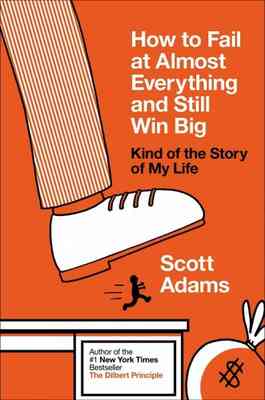How To Fail At Almost Everything And Still Win Big
Kind of the Story of My Life
In this book Scott Adams, creator of the Dilbert comic strip, uses stories from his own life to demonstrate that failure isn't necessarily a bad thing. His many failures are actually what led to his ultimate success.
"When I was in my twenties, I didn't know anyone who could tell me how to become a cartoonist, how to write a book, or how to be successful in general. This was a big obstacle to my success. It seemed as if other people were benefiting greatly from the wisdom of their friends and families. That's exactly the sort of inequality that pisses me off and motivates me at the same time. As a result, I've spent decades trying to figure out what works, and what doesn't, on the topic of success. If you want to be successful, in just about any field, let me be your starting point. I'll describe over the course of this book a sort of template for success that can serve as your launching pad. I won't always have the right formula for your specific situation, but I can help narrow your choices."
Some great ideas in the book include:
- Failure isn't necessarily a bad thing. Often what seems like a failure at the time ends up leading you to a much bigger success.
"Failure always brings something valuable with it. I don’t let it leave until I extract that value. I have a long history of profiting from failure."
- Use systems, not goals. Goals are for losers.
"Goal-oriented people exist in a state of continuous presuccess failure at best, and permanent failure at worst if things never work out. Systems people succeed every time they apply their systems, in the sense that they did what they intended to do. The goals people are fighting the feeling of discouragement at each turn. The systems people are feeling good every time they apply their system. That’s a big difference in terms of maintaining your personal energy in the right direction."
- Wishing is for losers. If you want something, find out the price, and then pay it.
- Every skill you acquire doubles your odds of success.
- Use your own personal energy as a metric to be maximised.
- Match your mental state to your tasks.
- We are moist robots with a terrible user interface. Understand how to program yourself.
- How our thoughts and imagination can be used to influence our attitude.
"Imagination is the interface to your attitude. You can literally imagine yourself to higher levels of energy. This is the same reasoning for why you should avoid exposure to too much news of the depressing type and why it’s a good idea to avoid music, books, and movies that are downers."
- Happiness is health plus freedom.
- Run your life as a series of experiments, don't take things at face value.
- Be careful who you surround yourself with.
A great blend of humour with serious advice and great insights and ideas. Such an enjoyable read that I had trouble putting it down.
